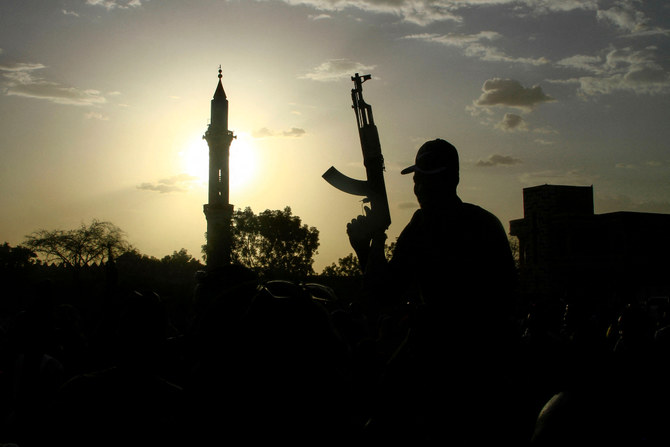PORT SUDAN: Pro-democracy activists in Sudan reported Friday that about 40 people were killed in “violent artillery fire” carried out the previous day by paramilitary forces on Omdurman, Khartoum’s twin city.
Sudan has been ravaged by war since April 2023, when fighting broke out between the army, led by military chief Abdel Fattah Al-Burhan, and the paramilitary Rapid Support Forces, commanded by Burhan’s former deputy Mohamed Hamdan Dagalo.
The Karari Resistance Committee, one of hundreds of grassroots pro-democracy groups that coordinate aid across Sudan, said the RSF was behind Thursday’s deadly attack on Omdurman.
“So far, the death toll is estimated at 40 civilians and there are more than 50 injured, some seriously,” the organization said in a statement posted on social media.
“There is still no precise count of the number of victims,” it said, adding their bodies were received by Al Nao university hospital and other private health facilities or were buried by their families.
The shelling comes a day after the RSF was accused of killing more than 104 people, including 35 children Wednesday in an attack on the village of Wad Al-Noura in Al-Jazira state, south of Khartoum.
In just over a year, the war has claimed thousands of lives, with some estimates putting the death toll as high as 150,000, according to the United States’ envoy to Sudan, Tom Perriello.
Since the start of the war, more than seven million people have fled their homes for other parts of Sudan, adding to 2.8 million already displaced from previous conflicts in the country of 48 million.
Fighting continues daily across the country, including in the capital, with both sides accused of war crimes including the deliberate targeting of civilians, indiscriminate shelling of residential areas and blocking humanitarian aid.
Children killed
At least 35 children were killed in the attack on Wad Al-Noura, with activists from the Madani Resistance Committee sharing images on social media of a row of white shrouds laid out on the ground.
UN Secretary-General Antonio Guterres strongly condemned the attack, while the UN resident coordinator for Sudan, Clementine Nkweta-Salami, said she was “shocked by reports of violent attacks and a high number of casualties” in the village and called for an investigation.
“Human tragedy has become a hallmark of life in Sudan. We cannot allow impunity to become another one,” she added.
The RSF is accused of looting as well as sexual and ethnic violence and has attacked entire villages across Sudan on multiple occasions.
In a statement, the paramilitaries said they had attacked three army camps in the region of Wad Al-Noura and clashed with them “outside” the inhabited area.
On Thursday, army chief Burhan visited the injured. In a statement he promised to “respond harshly” to the “crimes” of the RSF.
The head of the UN’s children’s agency, Catherine Russell, said she was “horrified by the reports that at least 35 children were killed and more than 20 children injured” in the attack.
“Attacks on civilians and civilian infrastructure are unacceptable and must cease immediately,” the UNICEF chief said.
Russell called on those fighting to abide by international law and for an end to the war.
On Thursday, the International Organization for Migration said the number of internally displaced persons could “exceed 10 million” in the coming days.
Starvation is also a growing threat in Sudan, with about 18 million people suffering from hunger and 3.8 million children acutely malnourished, according to UN agencies.


Sudan activists say about ‘40 dead’ in shelling near Khartoum
Short Url
https://arab.news/paxyw
Sudan activists say about ‘40 dead’ in shelling near Khartoum

- The RSF was behind Thursday’s deadly attack on Omdurman: aid organisation
- The shelling comes a day after the RSF was accused of killing more than 104 people, including 35 children
Angelina Jolie visits Egyptian side of Rafah crossing to Gaza

- The Hollywood star spoke with members of the Red Crescent and truck drivers ferrying humanitarian aid
RAFAH, Egypt: Hollywood star Angelina Jolie visited on Friday the Egyptian side of the Rafah crossing into Gaza, where she spoke with members of the Red Crescent and truck drivers ferrying humanitarian aid, AFP journalists said.
According to local media, the actor and former special envoy for the UN refugee agency made the visit to see the condition of injured Palestinians transferred to Egypt and to look into aid deliveries into the devastated territory.
© 2026 SAUDI RESEARCH & PUBLISHING COMPANY, All Rights Reserved And subject to Terms of Use Agreement.














